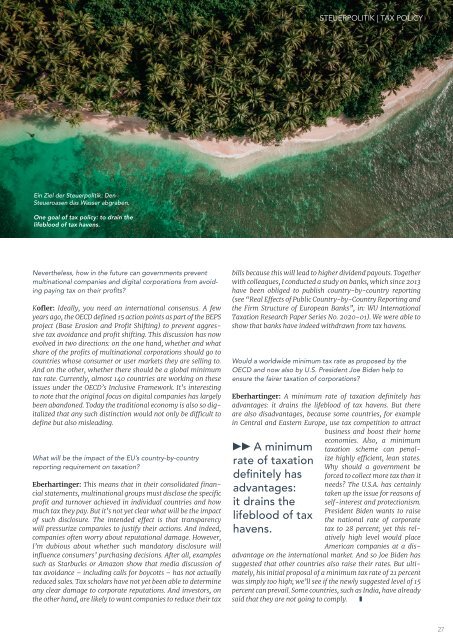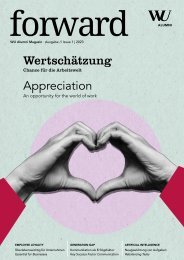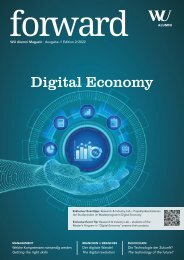forward – WU Alumni Magazin 2/2021
Die Ausgabe 2/2022 beschäftigt sich mit Steuern und Gerechtigkeit und damit verbundenen Themen wie dem Gender Pay Gap oder einer fairen Verteilung der Steuerlast. Außerdem gehen Expert/inn/en der Frage nach, was Pandemien kosten und wer die Coronarechnung Österreichs bezahlt. Die WU Wien sucht die Antworten auf die großen Fragen der Zeit und präsentiert die neu ins Leben gerufene WU Foundation zur Exzellenzsteigerung der Lehre und Forschung. Das WU Alumni Magazin forward erscheint zwei Mal pro Jahr. Mehr Infos unter www.wu-alumni.at
Die Ausgabe 2/2022 beschäftigt sich mit Steuern und Gerechtigkeit und damit verbundenen Themen wie dem Gender Pay Gap oder einer fairen Verteilung der Steuerlast.
Außerdem gehen Expert/inn/en der Frage nach, was Pandemien kosten und wer die Coronarechnung Österreichs bezahlt.
Die WU Wien sucht die Antworten auf die großen Fragen der Zeit und präsentiert die neu ins Leben gerufene WU Foundation zur Exzellenzsteigerung der Lehre und Forschung.
Das WU Alumni Magazin forward erscheint zwei Mal pro Jahr. Mehr Infos unter www.wu-alumni.at
Sie wollen auch ein ePaper? Erhöhen Sie die Reichweite Ihrer Titel.
YUMPU macht aus Druck-PDFs automatisch weboptimierte ePaper, die Google liebt.
STEUERPOLITIK | TAX POLICY<br />
Ein Ziel der Steuerpolitik: Den<br />
Steueroasen das Wasser abgraben.<br />
One goal of tax policy: to drain the<br />
lifeblood of tax havens.<br />
Nevertheless, how in the future can governments prevent<br />
multinational companies and digital corporations from avoiding<br />
paying tax on their profits?<br />
Kofler: Ideally, you need an international consensus. A few<br />
years ago, the OECD defined 15 action points as part of the BEPS<br />
project (Base Erosion and Profit Shifting) to prevent aggressive<br />
tax avoidance and profit shifting. This discussion has now<br />
evolved in two directions: on the one hand, whether and what<br />
share of the profits of multinational corporations should go to<br />
countries whose consumer or user markets they are selling to.<br />
And on the other, whether there should be a global minimum<br />
tax rate. Currently, almost 140 countries are working on these<br />
issues under the OECD’s Inclusive Framework. It’s interesting<br />
to note that the original focus on digital companies has largely<br />
been abandoned. Today the traditional economy is also so digitalized<br />
that any such distinction would not only be difficult to<br />
define but also misleading.<br />
What will be the impact of the EU’s country-by-country<br />
reporting requirement on taxation?<br />
Eberhartinger: This means that in their consolidated financial<br />
statements, multinational groups must disclose the specific<br />
profit and turnover achieved in individual countries and how<br />
much tax they pay. But it’s not yet clear what will be the impact<br />
of such disclosure. The intended effect is that transparency<br />
will pressurize companies to justify their actions. And indeed,<br />
companies often worry about reputational damage. However,<br />
I’m dubious about whether such mandatory disclosure will<br />
influence consumers’ purchasing decisions. After all, examples<br />
such as Starbucks or Amazon show that media discussion of<br />
tax avoidance <strong>–</strong> including calls for boycotts <strong>–</strong> has not actually<br />
reduced sales. Tax scholars have not yet been able to determine<br />
any clear damage to corporate reputations. And investors, on<br />
the other hand, are likely to want companies to reduce their tax<br />
bills because this will lead to higher dividend payouts. Together<br />
with colleagues, I conducted a study on banks, which since 2013<br />
have been obliged to publish country-by-country reporting<br />
(see “Real Effects of Public Country-by-Country Reporting and<br />
the Firm Structure of European Banks”, in: <strong>WU</strong> International<br />
Taxation Research Paper Series No. 2020-01). We were able to<br />
show that banks have indeed withdrawn from tax havens.<br />
Would a worldwide minimum tax rate as proposed by the<br />
OECD and now also by U.S. President Joe Biden help to<br />
ensure the fairer taxation of corporations?<br />
Eberhartinger: A minimum rate of taxation definitely has<br />
advantages: it drains the lifeblood of tax havens. But there<br />
are also disadvantages, because some countries, for example<br />
in Central and Eastern Europe, use tax competition to attract<br />
business and boost their home<br />
A minimum<br />
rate of taxation<br />
definitely has<br />
advantages:<br />
it drains the<br />
lifeblood of tax<br />
havens.<br />
economies. Also, a minimum<br />
taxation scheme can penalize<br />
highly efficient, lean states.<br />
Why should a government be<br />
forced to collect more tax than it<br />
needs? The U.S.A. has certainly<br />
taken up the issue for reasons of<br />
self-interest and protectionism.<br />
President Biden wants to raise<br />
the national rate of corporate<br />
tax to 28 percent; yet this relatively<br />
high level would place<br />
American companies at a disadvantage<br />
on the international market. And so Joe Biden has<br />
suggested that other countries also raise their rates. But ultimately,<br />
his initial proposal of a minimum tax rate of 21 percent<br />
was simply too high; we’ll see if the newly suggested level of 15<br />
percent can prevail. Some countries, such as India, have already<br />
said that they are not going to comply.<br />
27<br />
88391_<strong>WU</strong>_<strong>Alumni</strong>_Forward_2_<strong>2021</strong>_ICv2.indd 27 30.08.21 13:31




